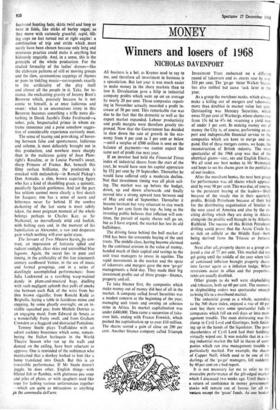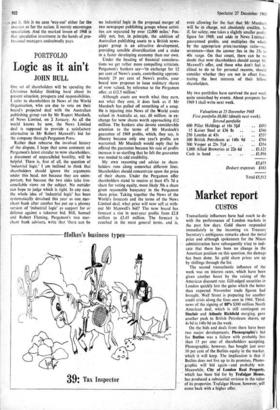Winners and losers of 1968
MONEY
NICHOLAS DAVENPORT
All business is a bet, as Keynes used to say to me, and therefore all investment in business is a speculation. But last year it was much easier to make money in the share markets than to lose it. Devaluation gave a fillip to industrial company profits which went up on an average by nearly 20 per cent. Those companies report- ing in November actually recorded a profit in- crease of 30 per cent. This remarkable rise was due to the fact that the domestic as well as the export market expanded. Labour productivity and profit margins were therefore greatly im- proved. Now that the Government has decided to slow down the rate of growth in the eco- • nomy from 4 per cent to 3 per cent or below —until a surplus of £500 million is seen on the balance of payments—we cannot expect the same sort of profit rise next year.
If an investor had held the Financial Times index of industrial shares from the start of the year, he would have seen his capital appreciate by 35/ per cent by 19 September. Thereafter he would have suffered only a moderate decline. Not that investment timing was all plain sail- ing. The market was up before the budget, down, up and down afterwards and finally moved into a strong upward turn between end of May and end of September. Thereafter it became hesitant but very reluctant to stay much below 5 per cent from the top. As long as the investing public believes that inflation will con- tinue, the pursuit of equity shares will go on, but as I have argued, the market has lost its old bullishness.
The driving force behind the bull market of 1968 has been the crescendo buying of the unit trusts. The middle class, having become alarmed by the continual erosion in the value of money, handed much of their capital and savings to the unit trust managers to invest in equities. The rapid movements in the market and the spate of takeovers and mergers gave the new `go-go' managements a field day. They made their big investment profits out of three groups—finance, property and oil.
To take finance first, the companies which make money out of money did best of all in the market. A company called Jessel Securities was a modest concern at the beginning of the year, managing unit trusts and owning an asbestos mine in Africa. Its market capitalisation was under £400,000. Then came a succession of take- over bids, ending with France Fenwick, which pushed the capitalisation up to over £10 million. The shares scored a gain of close on 290 per cent. Another finance company called Triumph
Investment Trust embarked on a different round of takeovers and its shares rose by otter
310 per cent. The `go-go Slater Walker Securi- ties also trebled but came Sack later in the year.
As a group the merchant banks, which always make a killing out of mergers and takeovers, more than doubled in market value last year.
Outstanding was Mercury Securities, which owns 50 per cent of Warburgs, whose shares rose
from 15s 6d to 47s 6d, returning a yield now of under 1 per cent. In making money out of money the City is, of course, performing an ex-
pert and indispensable financial service to the
companies which are keen to merge and ex- pand. Out of these mergers comes, we hope, the reconstruction of British industry. The most
spectacular of the 1968 crop was that of the electrical giants—Gec, AEI and English Electric.
We all send our best wishes to Mr Weinstock and hope to see his shares grow in the portfolios of our readers.
After the merchant banks, the next best group for performance was oil shares which appreci- ated by over 90 per cent. This was due, of course, to the persistent buying of the leaders—Shell because of the steady rise in their quarterly profits, British Petroleum because of their bid
for the distributing organisation of Sinclair in the west coast of America and also by the ex-
citing drilling which they are doing in Alaska alongside the prolific well brought in by Atlantic Richfield. The success of this British Petroleum
drilling could prove that the Arctic Circle has as rich 'an oilfield as the Middle East—both being derived from the Triassic or Jurassic sands.
Next after oil,, property shares as a group en- joyed a rise of 77 per cent. This market did not get going until the middle of the year when talk of continued inflation brought property shares into favour again as a inflation hedge. When reversions occur in office and flat properties, rents are usually doubled.
Other groups to do well were shipbuilding and tobaccos, both up 60 per cent. The recovery in shipbuilding orders was spectacular enough to bring life to a moribund market.
The industrial group as a whole, according to the 500 share index, enjoyed a rise of 40 per cent but there were some spectacular falls in companies which fell on evil days or into man- agement trouble. The most distressing was the
slump in Cyril Lord and Gorringes, both finish- ing up in the hands of the liquidator. The poor shareholders of Cyril Lord had their holdings
virtually wiped out. It was notable that in a ris- ing industrial market the fall in shares of com- panies which ran into management trouble is particularly marked. For example, the shares of Capper Neill, -Which used to be one of the darlings of the `go-go' managers, fell suddenly by 40 per cent on a bad report.
It is not necessary for me to refer to t. miserable performance of the gilt-edged marker which I discussed two weeks ago. Until there h a return of confidence in money governmen: stocks will remain out of favour for all in- vestors except the 'gross' funds. As one broker put it, this is no sane 'way-out' either for the investor or for the nation. It merely encourages speculation. And the marked lesson of 1968 is that speculative investment in the hands of pro- fessional managers undoubtedly pays.



































 Previous page
Previous page